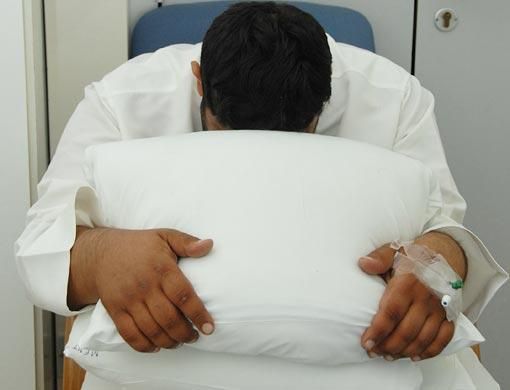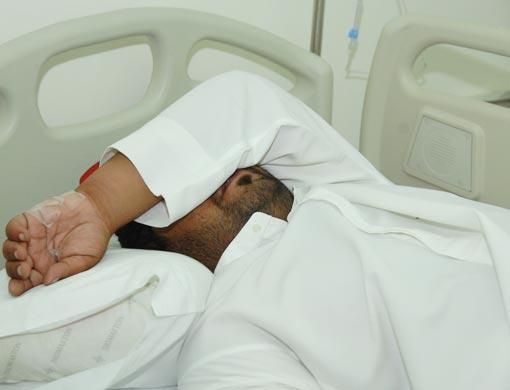Abu Dhabi: It's no way to sleep - certainly not for 16 years. Sari used to be exhausted as he slept while sitting or by putting pillows against the wall to rest his head on. Now, Al Mafraq Hospital has given him a good night's rest.
Emirati patient Sari, 27, has complained of an inability to sleep normally for 16 years. He had a persistently dry mouth and throat, as well as recurrent sore throat and tonsillitis. Whenever he tried to sleep normally, he suffered from choking and sleep apnea, in which sufferers stop breathing in their sleep. This can result in hypertension and cardiac dysfunctions which even cause sudden death during sleep.
For years, Sari sought medical advice but was not able to find an answer to his condition. He considered removing his tonsils a number of times, but doctors advised him not to.
Sari suffers from what doctors called Interrupted or Disturbed Sleeping, a condition which is not congenital but developed when he was a child. Due to multi-factoral symptoms and obesity, Sari had problems breathing when sleeping in a normal position.
"When he used to sleep, his nose was completely obstructed and he was out of breath. During the day he felt drowsy and lacked concentration. All of this was due to a lack of the oxygen in the blood going to the brain," said Yousuf Al Hefni, consultant and head of the ear, nose and throat (ENT) department at Mafraq Hospital.
Al Hefni was asked to speak on behalf of the patient, who did not wish to comment.
The doctor, who is overseas, told Gulf News in a telephone interview that the patient arrived at the hospital's ENT department complaining of inability to sleep normally for 16 years.
"He was unable to breathe properly due to having a blocked nose. He also had his mouth open to let the air pass through the lungs, which resulted in snoring," he said.
When the patient is asleep, he experiences choking and apnea, explained the doctor. As a result, the patient would wake up, then go back to sleep again. This episode would recur throughout the night and the amount of oxygen passing to the lung would decrease. Thus the oxygen in the blood and brain decreased, causing the patient to become drowsy and unable to concentrate at work during daytime.
The surgery correcting his condition lasted two and a half hours.
Sari is now able to sleep in a comfortable position and will not suffocate anymore, added Al Hefni.
Upon leaving the hospital Sari told doctors. "For 16 years I have hoped to sleep as others sleep. During that period, I tried to seek treatment, but I was advised not to undergo the operation due to its risk. Mafraq Hospital staff advised me about the necessity of operation. I used to be exhausted as I slept while sitting or by putting pillows against the wall to rest my head on. They did me a favour I will never forget. My kids and relatives were so happy that I have recovered and returned back to normal. I am so grateful to officials in Abu Dhabi Health Services Company and the medical staff at Mafraq Hospital."














